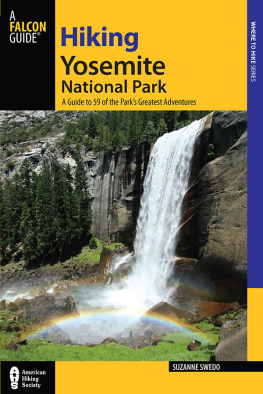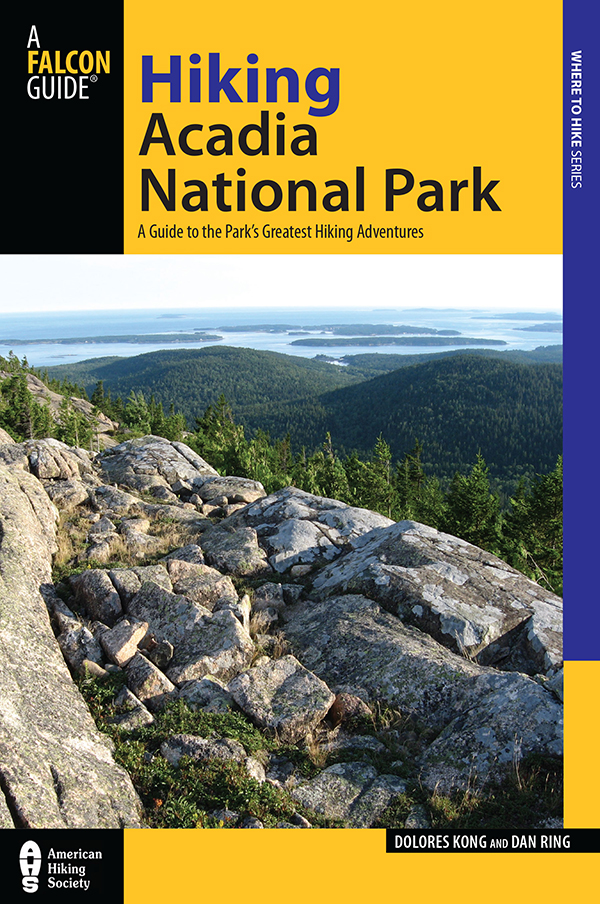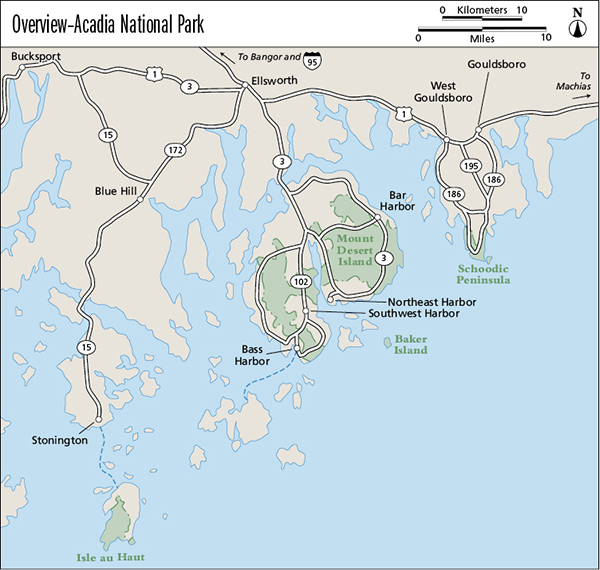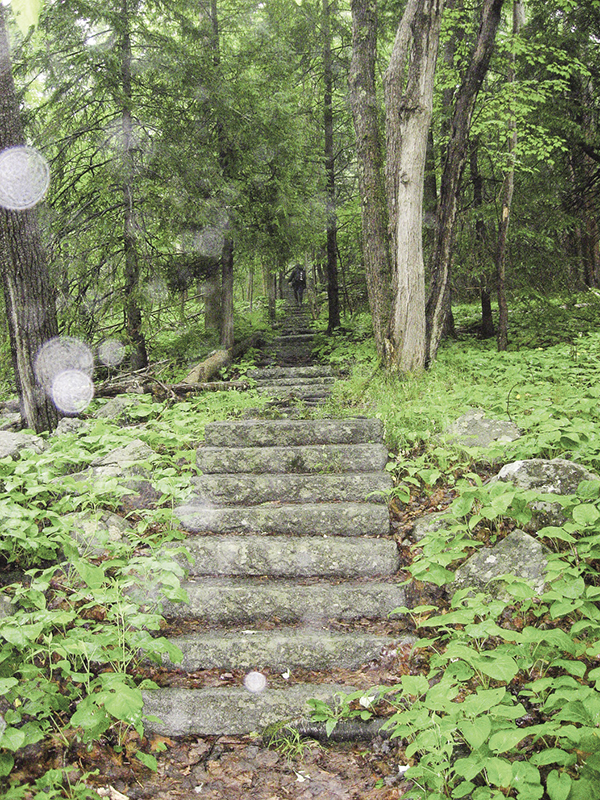Hiking Acadia National Park
A Guide to the Park's Greatest Hiking Adventures
Second Edition
Dolores Kong and Dan Ring
Copyright 2001, 2012 Morris Book Publishing, LLC.
Previous editions of this book were published by Falcon Publishing, Inc., in 1998 and 2000.
ALL RIGHTS RESERVED. No part of this book may be reproduced or transmitted in any form by any means, electronic or mechanical, including photocopying and recording, or by any information storage and retrieval system, except as may be expressly permitted in writing from the publisher. Requests for permission should be addressed to Globe Pequot Press, Attn: Rights and Permissions Department, P O Box 480, Guilford, CT 06437.
FalconGuides is an imprint of Globe Pequot Press.
Falcon, FalconGuides, and Outfit Your Mind are registered trademarks of Morris Book Publishing, LLC.
All interior photographs by Dolores Kong, unless otherwise noted.
Text design: Sheryl P. Kober
Project editor: Julie Marsh
Layout: Sue Murray
Maps: Trailhead Graphics Morris Book Publishing, LLC.
TOPO! Explorer software and SuperQuad source maps courtesy of National Geographic Maps. For information on TOPO! Explorer, TOPO!, and Nat Geo Maps products, go to www.topo.com or www.natgeomaps.com.
The Library of Congress has catalogued the previous edition as follows:
Kong, Dolores.
Hiking Acadia National Park / by Dolores Kong and Dan Ring. 1st ed.
p. cm.
1. HikingMaineAcadia National ParkGuidebooks. 2. TrailsMaineAcadia National ParkGuidebooks. 3. Acadia National Park (Me.)Guidebooks. I. Ring, Dan (Daniel) II. Title.
GV199.42.M22 A324 2001
917.41'450444dc21
2001023941
ISBN 978-0-7627-9710-3
The authors and Globe Pequot Press assume no liability for accidents happening to, or injuries sustained by, readers who engage in the activities described in this book.
Contents
Acknowledgments
For sharing with us their knowledge and passion for Acadia National Park, and being so generous with their time, wed like to thank Wanda Moran, Charlie Jacobi, Gary Stellpflug, Chris Barter, David Manski, Kathy Grant, Stuart West, Karen Anderson, Anne Warner, Tony Linforth, Maureen Fournier, Todd Miller, Benton Shattenberg, and the rest of the Acadia National Park staff; Margaret Coffin Brown of the National Park Services Olmsted Center for Landscape Preservation; Ann Marie Cummings of Eastern National; Marla S. OByrne of the Friends of Acadia; park volunteers Jim and Jan Allen and Ed Hawkes; Sue Turner and Stew Foelix; Dianna and Ben Emory; Donald P. Lenahan; and Jill Weber. We'd also like to acknowledge the historical perspective provided by Ronald Epp in his writings on park pioneer George B. Dorr and his estate.
And wed like to thank our nieces Sharon and Michelle Kong for providing a new perspective on Acadia for us. We hope theyve come away with special memories, as we have.
HELP US KEEP THIS GUIDE UP TO DATE
Every effort has been made by the author and editors to make this guide as accurate and useful as possible. However, many things can change after a guide is publishedtrails are rerouted, regulations change, techniques evolve, facilities come under new management, and so on.
We would appreciate hearing from you concerning your experiences with this guide and how you feel it could be improved and kept up to date. While we may not be able to respond to all comments and suggestions, well take them to heart, and well also make certain to share them with the author. Please send your comments and suggestions to the following address:
Globe Pequot Press
Reader Response/Editorial Department
P.O. Box 480
Guilford, CT 06437
Or you may e-mail us at: editorial@GlobePequot.com
Thanks for your input, and happy trails!
Introduction
Maines Acadia National Park is a place like no other.
You can stroll along Ocean Path and be awestruck by the contrast of pink granite cliffs, blue skies, and white surf. From atop Cadillac, the highest mountain on the Atlantic seaboard, you can look below and see fog rolling in over Frenchman Bay, even as the sun shines brightly above.
No wonder artists, millionaires, generations of families, and even presidentsnotably Barack Obama in 2010have been attracted to all thats preserved in Acadia.
In fact, the place has meant so much to area residents and visitors that Acadia in 1919 became the first national park created east of the Mississippi, after starting as a national monument in 1916. It is also the first national park to consist primarily of privately donated lands and the first to have trail maintenance funded by an endowment, Acadia Trails Forever, coming from $4 million in park user fees and federal appropriations and $9 million in private donations from Friends of Acadia, a private nonprofit organization based in Bar Harbor.
Over the years the scenery inspired such passion that nineteenth-century painters Thomas Cole and Frederic Church, of the Hudson River School, came here to capture the landscape; one of the wealthiest men in America, John D. Rockefeller Jr., donated millions and left miles of scenic carriage roads and uniquely designed stone bridges; and prime mover George B. Dorr dedicated his life and exhausted his family fortune to create the park.
Today more than two million visitors a year make Acadia one of the top ten most visited national parks, even though its the fifth smallest in land area. The Sierra Club even put Acadia first on its 2011 Top Ten Wild Places to Hike, a bucket list of sorts.
But with more than 125 miles of hiking trails and 45 miles of carriage roads throughout its approximately 49,500 acres (including about 12,000 acres under conservation easement), the park provides plenty of opportunities for tranquility and for experiencing nature, history, geology, and culture.
This second edition of Hiking Acadia National Park covers nearly all the parks trails.
Most of the trails are located on Mount Desert Island, within a short rideand in some cases a short walkfrom Bar Harbor, the islands main town. The book also includes trails on Isle au Haut, reachable only by mail boat from Stonington, and on Schoodic Peninsulathe only part of the park on the mainlandaccessible by ferry from Bar Harbor during the peak season or by car anytime.
No backpacking is allowed in the park except for a limited amount at designated campsites on Isle au Haut; the lean-to shelters require a special use permit obtained in advance. No camping is allowed on trails anywhere in the park.
Some of the forty-three granite steps that take you to the site of George B. Dorrs former estate (hike 2).
Since the first FalconGuides edition of this guide in 2001, some new trails have been added, and many trail names have been changed to make them historically correct. This new edition includes those important revisions, which were made under a comprehensive multiyear, multimillion-dollar effort by the National Park Service and Acadia Trails Forever to update the historic network, and as part of the implementation of the parks 2002 Hiking Trails Management Plan. Among the historic routes recently restored: Schooner Head Path, Homans Path, Murphy Lane, and sections of the Orange & Black Path, Penobscot Mountain Trail, and Canada Cliff Trail.







